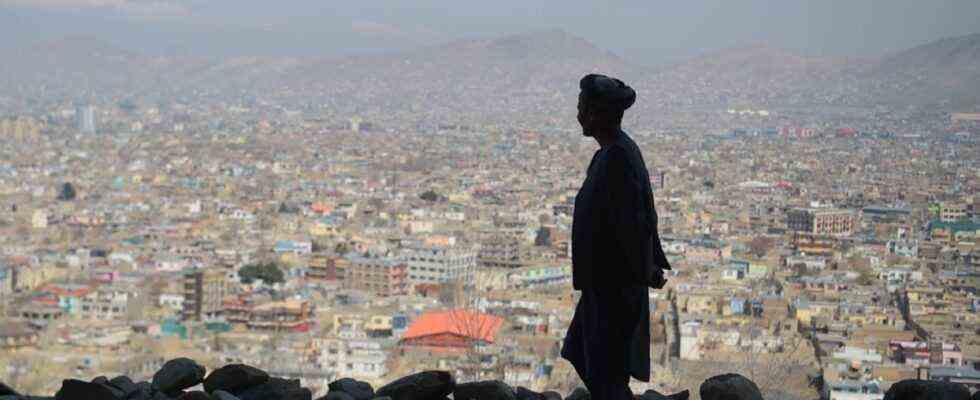With the DHL Express post service, 220 countries can be sent – actually Afghanistan too. The logistics group had a branch in the country. But now the already challenging work is over, of course. The service is “currently discontinued,” it says on the website. This severed one of the already few solid economic ties between Germany and Afghanistan. Because as much as the focus was and remains on the country – so little has it been able to establish itself as a destination for private sector investments or as a sales market in the past 20 years.
“German-Afghan economic relations are at a low-threshold level,” says Volker Treier, head of foreign trade at the German Chamber of Commerce and Industry. In 2020, the trading volume was around 70 million euros. Cars and auto parts, machinery and food were among the few goods exported to Afghanistan despite sanctions controls. Even less came back. Agriculture is still dominated by the illegal cultivation of the heroin raw material opium and the factories and workshops in the country are too rudimentary to be relevant for Germany.
The country is actually sitting on a huge treasure: lithium and copper, aluminum and gold, coal and cobalt and many more raw materials totaling around one trillion US dollars are in the Afghan earth, estimate US geologists who carry out extensive explorations have employed. “There is a breathtaking potential here,” was how the then US Commander-in-Chief David Petraeus was quoted a decade ago. The US army is said to have even said internally that Afghanistan is the “Saudi Arabia of lithium”, referring to the fact that oil gushes in Saudi Arabia and is a source of prosperity: Lithium is one of the most important and most sought-after materials for electromobility and battery cells. In an advertising brochure from the Afghan Ministry of Oil and Mining from 2019, President Ashraf Ghani, who has now fled, said aptly: Mining is the greatest opportunity to generate economic growth for the country.
A photo from another time: NATO soldiers visit a coal mine in Herat in spring 2019.
(Photo: Hossein Fatemi / dpa)
But the precarious security situation has barely allowed exploitation – which, absurdly, could change with the withdrawal of Western troops: the efforts by Russia, Turkey and above all China to hold talks with the Taliban these days should not only be based on security interests have to do, but also with the prospects for these rich natural resources. The overthrown Afghan government had long ago sold the exploitation rights of a large copper mine southeast of Kabul to a Chinese state-owned company for three billion US dollars.
But so far, the people have not received anything from the contract. The funding has not really started yet, because the Chinese have also found the situation too uncertain up to now. This is why Afghanistan is currently one of the poorest countries in the world: according to the official figures, one in four employable people was unemployed before the Covid crisis. One in ten newborns dies, the highest mortality rate in the world. The life expectancy of the approximately 38 million people averages 53 years, nowhere in the world is it lower.
For the past 20 years Afghanistan has been on the drip of the international community, which is likely to distort the gross domestic product of around 20 billion euros. Germany alone had planned to provide 430 million euros in civil assistance this year. In view of the takeover by the Taliban, however, the development aid ministry has just announced a stop to all aid. This affects several dozen projects that are also co-financed by the Reconstruction Loan Corporation (KfW). Their Afghanistan budget is 1.2 billion euros. Loans that were extended to Afghan ministries on a project-by-project basis and that were sometimes also used by German companies when they were tendered. Or should come.
Siemens Energy signed a letter of intent in 2020. It is now obsolete
For example, Siemens Energy signed a letter of intent with the Afghan government last November to build electricity grids and power plants. This appointment is now obsolete. The question is how to deal in the medium term with the projects that have already started, such as the expansion and asphalting of the national road from the city of Kunduz to Khulm for the 39.5 million euros or the construction of the Faizabad hydropower plant or the renovation the water supply of Kabul.
German and European companies have often advised their engineers on this. Although this work had become increasingly difficult in the past few years. “The confusing security situation in Afghanistan poses special challenges for local employees,” says a technical service provider, for example. Not all construction sites are easily accessible to international personnel. In order to still guarantee a complete progress control, this company has relied on remote monitoring by computer. The very best results cannot be achieved in this way – and mining is certainly not established.
As a donor, KfW has not sent any of its own people from its Frankfurt headquarters to Afghanistan for five years. Instead, the two offices in Kabul and Mazar-i-Sharif relied on local employees. Just like all other German companies did: “As far as we know, no German company with German employees is represented on site,” says DIHK foreign trade director Treier. And he says what everyone who has anything to do with Afghanistan says: “Nevertheless, there are Afghan nationals who are employed by German companies and are still in the country.” Try to get them to safety now.

